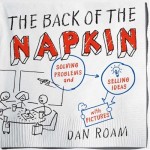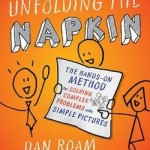Neurobics: Low-Effort Cognitive Stimulation!
 Neurobics is a unique approach to brain training developed from the latest findings in neurobiology. According to one popular approach, Keeping Your Brain Alive, the core idea is this:
Neurobics is a unique approach to brain training developed from the latest findings in neurobiology. According to one popular approach, Keeping Your Brain Alive, the core idea is this:
“Neurobic exercises use your five physical senses and your emotional sense in unexpected ways and encourage you to shake up your everyday routines. Neurobics don’t require paper and pen or isolating yourself with puzzles. Everyday life is the Neurobic Brain gym. They can be done anywhere, anytime in offbeat, fun and easy ways while you’re getting up, commuting, working, eating, shopping or relaxing. They are designed to help the brain manufacture its own nutrients that strengthen, preserve and grow brain cells.”
Some examples:
- Take a different route when commuting to work this morning
- Brush your teeth with the other hand
- Use just the sense of touch when unlocking a door (don’t look at the lock)
- Move your waste basket at work
- Sit someone different at the dinner table tonight
Tiny changes with a significant and positive neurochemical impact. Any exercise can be Neurobic as long as it involves your senses in a new context, demands attention and breaks routine. This means we can design our own! The Keep Your Brain Alive Program was developed by Larry Katz a well-known Duke University Neurobiologist and includes 83 very specific things to try.
Interested to hear from readers that do Neurobics. What exercises do you do and how have you built them into your daily routine?
Categories: Books, Cognitive Decline, Lifestyle, Manage Emotions, Mental Focus, Perception Tags: brain training, experiential learning
Does Raising a Child Make You Smarter?
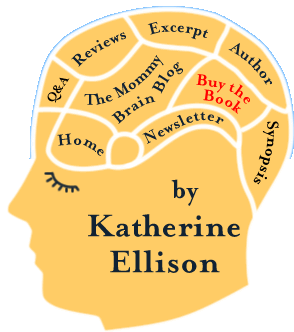 Absolutely, if you are the Mother! At least that is the argument made Katherine Ellison in her book the Mommy Brain: How Motherhood Makes Us Smarter.
Absolutely, if you are the Mother! At least that is the argument made Katherine Ellison in her book the Mommy Brain: How Motherhood Makes Us Smarter.
Motherhood gives a brain boost in many ways including face reading, multi-tasking, fearlessness, serenity, empathy, assertiveness and mental dexterity. These improvements in both IQ and EQ come from a combination of new hormones, motivation and practice that motherhood brings about.
The book is well founded in the latest neuroscience. It upends the stereotype of mothers checking their brains at the delivery room doors. Check out the Mommy Brain site by clicking on the graphic to the right.
Categories: Books, IQ and EQ, Lifestyle, Manage Emotions, Mental Focus, Parent, Perception Tags: embodied cognition, EQ
Audio CDs on Mindfulness – Do They Work?
 Mindfulness techniques are designed to bring us into the present moment as fully as possible. It involves paying attention on purpose and without judgment. Mastering this type of attentional focus has proven to be a gateway for higher cognitive performance.
Mindfulness techniques are designed to bring us into the present moment as fully as possible. It involves paying attention on purpose and without judgment. Mastering this type of attentional focus has proven to be a gateway for higher cognitive performance.
Several self-instruction techniques for doing mindfulness training have been covered in other posts on the Next Brain Blog. Unfortunately, it can be difficult for beginners to use such techniques on their own. It is best to work with an experienced guide. This can be expensive and inconvenient. One alternative is to try and get such guidance off a CD. But do they really help?
To find out I bought a copy of the audio book Mindfulness for Beginners. It is a $13 two-CD set prepared by Jon Kabat-Zinn a well known leader in the field. The first CD provides an overview of the foundations of mindfulness and the second walks you through five distinct mediations or training exercises. I listened to both CD and then practiced the mediation that seemed most interesting. Although the narration style took some getting use to, the coaching and just plain reassurance was key for making progress.
One point that was particularly important (for me at least) was coaching around what to do as your mind wanders during the mediation.
Dr. Kabat-Zinn was very clear that such wandering is fine. The goal is not to stop it but to gently bring your attention back to the present. You do this by refocusing your attention on the subject of the mediation – eating a rasin in my case – over and over again. Indeed, for the beginner, bringing your attention back to focus on the mediation is the point of the exercise. Bring it back enough times and focusing becomes a habit. I experienced a bit of that! Something I was not able to do working on my own with books.
 I was attracted to the eating mediation because the exercise walks you through looking at, feeling, smelling, hearing, salivating, chewing, swallowing and otherwise sensing a raisin. May sound a bit strange but I can see many uses in my design work for such direct sensory experience. My plan is to try the other mediations and then build one into my daily mind training routine.
I was attracted to the eating mediation because the exercise walks you through looking at, feeling, smelling, hearing, salivating, chewing, swallowing and otherwise sensing a raisin. May sound a bit strange but I can see many uses in my design work for such direct sensory experience. My plan is to try the other mediations and then build one into my daily mind training routine.
I am interested to hear from readers that can recommend other CDs for mindfulness training.
Categories: Books, Mental Focus, Perception, Training Tags: Buddhist, mindfulness
A Store Just for Your Brain
 Marbles is a store just for your brain. They have four locations in Illinois and are looking to expand. Fortunately, their products are available online.
Marbles is a store just for your brain. They have four locations in Illinois and are looking to expand. Fortunately, their products are available online.
They offer an overview of brain fitness, a free self assessment and products to improve memory, critical thinking, coordination, word skills and visual perception. They provide books, brain software, toys and novelty items from many different vendors. Marbles takes the time to make gift bundles for the Wordsmith, Trickster, Creative Genius, Brainetics (whatever that is) and others. They offer some free Brain Coaching and sponsor a number of interesting events.
Marbles could well be a superstore for anyone looking to improve brain function and cognitive performance. They will be the subject of regular posts on the Next Brain Blog. I am interested to hear from readers that have visited one of the store locations.
Categories: Books, Cognitive Decline, Decision Making, Memory and Learning, Perception, Software, Training Tags: brain training, cognitive fitness
Build Problem Solving Skills with Visual Thinking
Drawing a diagram can be a powerful problem solving technique. Creating a visual representation forces our brain to process information in a specific way and it provides something new for us to see or perceive. Any technique, no matter how simple, that cause us to think differently and see differently holds the promise for improving problem solving and creativity.
Visual techniques designed to systematically stimulated improved thinking will be a frequent topic on the Next Brain Blog. Take for example, the recent work by Dan Roam. He has two books on on using visual thinking including The Back of the Napkin and Unfolding the Napkin.
His work is based on a four-step approach to visual thinking including look, see, imagine and show.
If you want to a jump-start on Roam’s approach to visual thinking, check out this 8-page BPTrends review of the Back of the Napkin.
I am interested to hear from readers that have used visual thinking techniques to improve problem solving, creativity or other aspects of cognition.
Categories: Books, Executive, Leader, Perception, Problem Solving, Professional, Software, Training Tags: creativity
Can You Use the Internet and Mobile Phones to Rewire Your Brain?
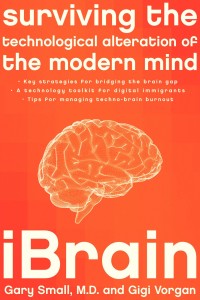 Email, search engines, social networking sites, text messaging, blogging, twitter, web-based phones, GPS, playing/making music/videos, taking and instantly sharing pictures and a slew of other technological capabilities have become widely available thanks to the internet, mobile phones and other hand-held gadgets. These new ways of creating, finding, sharing and using information are so powerful and pervasive that they are transforming how we learn, make-decisions, collaborate creatively and do many other brain-intense activities.
Email, search engines, social networking sites, text messaging, blogging, twitter, web-based phones, GPS, playing/making music/videos, taking and instantly sharing pictures and a slew of other technological capabilities have become widely available thanks to the internet, mobile phones and other hand-held gadgets. These new ways of creating, finding, sharing and using information are so powerful and pervasive that they are transforming how we learn, make-decisions, collaborate creatively and do many other brain-intense activities.
Some argue that they make us smarter or dumber. For example, the Atlantic Magazine article, Is Google Making Us Stupid? triggered a firestorm of discussion. Fortunately, the answer is no. Google and using search engines actually makes us smarter! Others take the point further and argue that the collective effect of all these technologies is driving a rewiring of our brains on a basic level. For a good introduction to this type of argument check out the book, Surviving the Technological Alteration of the Modern Mind.
The book’s theme is controversial but the authors do a great job outlining the specific technologies and their likely impact on boosting or dowsing cognitive performance. This is just the kind of information we will be covering in the Next Brain Blog. I will look at each claim and recommendation in later posts.
In the meantime, I am interested to hear reader stories on how the internet or mobile computing is being used to improve cognitive performance and build a better and longer-lasting brain.
Categories: Books, Decision Making, IQ and EQ, Memory and Learning, Perception, Software Tags: creativity
Doing Simple Math Fast is a Major Brain Stimulant
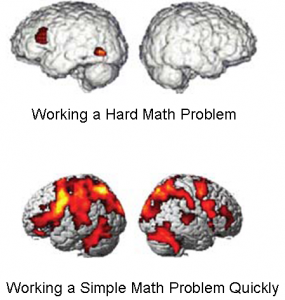 Doing simple calculations (3 + 5 = ?) very fast is becoming a popular brain training technique. It was pioneered by Dr. Ryuta Kawashima a Neuroscientist from Japan. He is well-known for the book Train Your Brain: A Better Brain in 60 Days, and BrainAge the Nintendo-based brain fitness system that we have covered on the Next Brain Blog before.
Doing simple calculations (3 + 5 = ?) very fast is becoming a popular brain training technique. It was pioneered by Dr. Ryuta Kawashima a Neuroscientist from Japan. He is well-known for the book Train Your Brain: A Better Brain in 60 Days, and BrainAge the Nintendo-based brain fitness system that we have covered on the Next Brain Blog before.
Similar techniques are popping up in many other brain training games and programs, especially those designed for mobile phones. For example, check out the Brain Blast Trainer series of iPhone apps.
The question is, does a daily dose of rapid mental mathematics improve your cognition, and if so in what way?
I have not been able to find literature that deals with this question. Dr. Kawahima’s research however, seems to clearly indicate (see figure) that doing simple math calculations rapidly stimulates the brain far more than doing hard math problems. Working the brain hard, like working a muscle hard should make it “bigger and stronger”.
I would like to hear from readers that use simple math as part of their brain fitness workout.
Source: Brain scanning images adapted from BrainAge Instruction Booklet
Categories: Books, Cognitive Decline, Problem Solving, Software, Training Tags: cognitive fitness, games
Vitamins for Cognitive Performance
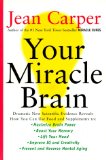 I am often asked if there are specific vitamins that are proven to enhance brain and cognitive function. The answer is yes but the level of improvement is not always clear. Vitamins that are generally called out for their brain boosting effects include:
I am often asked if there are specific vitamins that are proven to enhance brain and cognitive function. The answer is yes but the level of improvement is not always clear. Vitamins that are generally called out for their brain boosting effects include:
- B vitamins – memory and brain development
- Antioxidants or vitamins E, C and A (beta carotene) – overall functioning
- Multivitamins – overall functioning
Of course it is not just vitamins that help our brain function well but other supplements (e.g. minerals and fatty acids) and the foods we eat. Diet and supplements will be a frequent topic on the Next Brain Blog.
For a comprehensive overview of how supplements and diet impact brain function I suggest you read (or listen to) Jean Carper’s book, Your Miracle Brain: Dramatic New Scientific Evidence Reveals How You Can Use Food and Supplements To: Maximize Brain Power, Boost Your Memory, Lift Your Mood, Improve IQ and Creativity, Prevent and Reverse Mental Aging.
If you take supplements or have customized your diet to improve cognitive performance please leave a comment and share your results.
Categories: Books, Cognitive Decline, Diet, IQ and EQ, Memory and Learning, Mental Focus Tags: vitamins
Is Your Next Brain in Fact Your Heart?
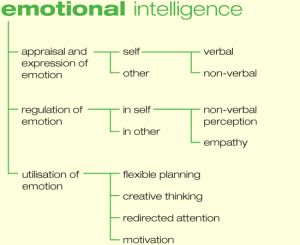 Daniel Goleman popularized the notion of Emotional Intelligence in 1995 in his best selling book by the same name. The idea is that a lot of what counts as smarts comes from our ability to perceive and manage emotions in ourselves and others. This is the foundation for self control and healthy relationships and leads to a successful life. The focus on emotional thinking versus rational or logical thinking as a key to intelligence was a huge paradigm shift that is still unfolding today.
Daniel Goleman popularized the notion of Emotional Intelligence in 1995 in his best selling book by the same name. The idea is that a lot of what counts as smarts comes from our ability to perceive and manage emotions in ourselves and others. This is the foundation for self control and healthy relationships and leads to a successful life. The focus on emotional thinking versus rational or logical thinking as a key to intelligence was a huge paradigm shift that is still unfolding today.
There is no doubt that understanding and manging emotions is a key for improving learning, decision-making, creativity, collaboration and other cognitive skills. Emotional intelligence will be a frequent topic on the Next Brain Blog. In an earlier post I provided links to quick and in-depth surveys that let you measure your emotional quotient (EQ) or level of emotional intelligence. In this post we will start to examine techniques for improving it.
For a quick introduction to how to develop your EQ check out the HELPGUIDE’s post on Five Key Skills for Building Emotional Intelligence. Although there are literally thousands of websites, books and other resources for learning about EQ I like this site. It demonstrates that emotional intelligence is rooted in common-sense life skills such as quickly reducing stress and managing your own feelings. No rocket science but the fact is that we often don’t take the time to develop specific skills to do these kinds of things and that impedes our cognitive performance.
Check the site out and please comment on the specific techniques you use to develop EQ.
Source: Emotional Intelligence Image
How Your Mind Improves With Age
 We have been taught that our minds decline with age. We become more forgetful, find it harder to learn, cannot focus as intensely, loose our creative powers and cannot master new technical specialties. Our brain cells die off, new connections don’t form and our brains shrink. A dark picture of increasing cognitive decline.
We have been taught that our minds decline with age. We become more forgetful, find it harder to learn, cannot focus as intensely, loose our creative powers and cannot master new technical specialties. Our brain cells die off, new connections don’t form and our brains shrink. A dark picture of increasing cognitive decline.
Fortunately, a growing number of studies show that some of these ideas are false and that we actually improve in certain aspects of cognitive performance as we age. We keep most of our brain cells and can form major new connections through something called neuroplasticity much later into life than previously thought. We develop greater abilities in drawing conclusions from examples, making judgement, seeing the meaning of situations and many other aspects of mental functioning.
In a recent blog post, Barbara Strauch, deputy science editor and health and medical science editor at The New York Times writes:
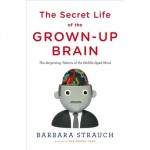 “Over the past few years, neuroscientists have begun to zero in on the brain’s changes in middle age, and what they’ve found is encouraging. Results of long-term studies show that — contrary to stereotypes — we actually grow smarter in key areas in middle age which, with longer life spans, now stretches from our mid 40s to our mid to late 60s.”
“Over the past few years, neuroscientists have begun to zero in on the brain’s changes in middle age, and what they’ve found is encouraging. Results of long-term studies show that — contrary to stereotypes — we actually grow smarter in key areas in middle age which, with longer life spans, now stretches from our mid 40s to our mid to late 60s.”
She expands on this point in her fourth coming book, The Surprising Talents of the Middle-Aged Mind.
The importance of this type of research for improving our minds and brains is significant. Why?
The assumptions we make about our own cognitive abilities strongly determines how well we perform.
For example, assuming you are forgetful, less creative, unable to master a second language or that math is impossible to learn all lower cognitive performance. Changing self-limiting assumptions about our own minds and the social stereotypes about aging brains mentioned above will take a long time. But it is a powerful means for improving cognitive performance and will be a frequent topic on the Next Brain Blog.
Source: Image of Older Adult
Categories: Books, Cognitive Decline, IQ and EQ, Older Adult Tags:

